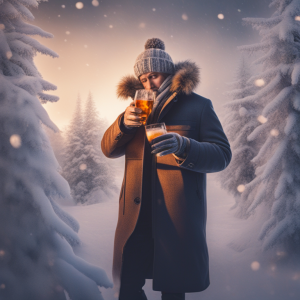Understand the Dangerous Implications of Alcohol Consumption in Cold Weather
As winter approaches, especially in extremely cold climates, the instinct to seek warmth can sometimes lead individuals to alcohol. However, it’s crucial to recognize the serious risks that accompany this choice. This article aims to reveal the dangers associated with consuming alcohol in freezing temperatures, highlighting why this practice is not only perilous but also ineffective for maintaining body heat. By increasing your awareness of these risks, you can make informed choices that prioritize your safety and well-being during the harsh winter months, ensuring you navigate these conditions without compromising your health.
Before we explore the associated dangers, it’s vital to debunk the widespread myth that alcohol acts as a warming agent. When consumed, alcohol causes the dilation of blood vessels near the skin’s surface, which may initially offer a deceptive sense of warmth. This fleeting feeling can mislead individuals into believing they are safe from the cold. However, it fails to address the critical need for maintaining a stable internal body temperature. The reality is that alcohol consumption can be detrimental, impairing your ability to withstand cold weather and significantly increasing the risk of severe health complications, including hypothermia.
 One of the most pressing dangers associated with alcohol consumption in cold weather is the heightened risk of dehydration. Alcohol functions as a known diuretic, promoting increased urine production and resultant fluid loss. Additionally, the dry air commonly found in winter conditions exacerbates this issue, as our bodies lose moisture more rapidly in such climates. The combination of these factors can result in dangerously low hydration levels, which are essential for maintaining overall health and survival. Dehydration doesn’t just affect physical performance; it also impairs cognitive functions, leading to difficulties in clear thinking and making rational decisions in critical situations.
One of the most pressing dangers associated with alcohol consumption in cold weather is the heightened risk of dehydration. Alcohol functions as a known diuretic, promoting increased urine production and resultant fluid loss. Additionally, the dry air commonly found in winter conditions exacerbates this issue, as our bodies lose moisture more rapidly in such climates. The combination of these factors can result in dangerously low hydration levels, which are essential for maintaining overall health and survival. Dehydration doesn’t just affect physical performance; it also impairs cognitive functions, leading to difficulties in clear thinking and making rational decisions in critical situations.
Recognize How Alcohol Impairs Judgment and Awareness in Cold Environments
Another significant consequence of alcohol consumption is its detrimental effect on cognitive function and decision-making abilities. In survival scenarios, the ability to make clear, rational decisions is paramount for ensuring one’s safety. Alcohol can cloud judgment, making it increasingly challenging to respond appropriately to potential hazards. This diminished capacity for reasoning can lead to accidents and poor choices, which are particularly dangerous when confronted with extreme cold. Staying vigilant and aware of your surroundings is essential; however, alcohol undermines this necessity, resulting in a higher likelihood of mistakes that could jeopardize personal safety and well-being.
Moreover, alcohol interferes with the body’s natural mechanisms for regulating temperature. Upon consumption, alcohol causes blood vessels in the skin to expand, leading to an increase in heat loss. While this may initially create a temporary sensation of warmth, it ultimately accelerates the loss of core body heat, which is vital for survival. This situation creates a perilous cycle where the brief warmth leads to a swift decline in core temperature, significantly raising the risk of life-threatening conditions such as hypothermia. It is crucial to understand that, although alcohol might seem to provide immediate relief from the cold, it actually increases your vulnerability to extreme weather conditions.
Explore the Alarming Link Between Alcohol Consumption and Hypothermia Risk
In discussing hypothermia, it’s essential to grasp how alcohol consumption can obscure the early warning signs of this critical condition. Hypothermia occurs when the body’s core temperature falls below the normal range, typically below 95 degrees Fahrenheit (35 degrees Celsius). Symptoms can manifest as shivering, confusion, fatigue, and decreased coordination. However, alcohol suppresses our body’s natural responses, making it more difficult to identify these vital indicators. By the time hypothermia symptoms become apparent, it may already be too late to prevent serious injury or even life-threatening consequences, underscoring the need for cautious behavior in cold situations.
In winter survival scenarios, there are numerous safer and more effective strategies to maintain body warmth without resorting to alcohol. Here are several practical tips that can significantly enhance your ability to stay warm and safe:
1. Dress in Layers for Optimal Warmth: Wearing multiple layers of clothing is essential for effectively trapping warm air. Begin with thermal base layers, incorporate insulating mid-layers, and complete your outfit with a windproof and waterproof outer layer to create a protective barrier against the cold.
2. Ensure Your Clothing and Footwear Remain Dry: Moisture can accelerate heat loss, so it’s imperative to keep your clothing and footwear dry at all times. Opt for waterproof materials and change into dry garments whenever necessary to help maintain warmth and comfort.
3. Insulate Yourself from the Cold Ground: Utilizing sleeping mats or insulation pads can greatly reduce heat loss, particularly during sleep. This practice is critical for conserving body heat during extended periods spent in chilly environments.
4. Choose Warm, Non-Alcoholic Beverages: Instead of turning to alcohol, consider enjoying hot beverages like tea, coffee, or hot chocolate. These drinks provide warmth without the negative side effects associated with alcohol consumption, ensuring your body remains in a safe state.
5. Construct or Seek Shelter for Protection: Actively searching for or building a shelter can significantly minimize exposure to harsh winds and frigid temperatures. A well-constructed shelter is crucial for retaining body heat, thereby enhancing your chances of staying warm and safe.
6. Fuel Your Body with High-Calorie Nutrition: Consuming nutrient-dense foods rich in calories can supply your body with the necessary energy to generate warmth. Foods such as nuts and fatty fish are excellent sources of healthy fats, which can be particularly beneficial in cold environments.
Understanding the dangers associated with alcohol consumption in freezing temperatures is vital for anyone engaged in winter survival scenarios. Despite the temporary sensation of warmth, alcohol can lead to dehydration, impaired decision-making, hindered temperature regulation, and can mask the symptoms of hypothermia. By avoiding alcohol and implementing safe, effective strategies, we can enhance our chances of surviving and thriving in challenging winter environments. Stay alert, prepare thoroughly, and prioritize your safety above all else.
The post Hazards of Alcohol Consumption in Extreme Cold Conditions appeared first on Survival Bite.
The Article Alcohol Consumption Hazards in Extreme Cold Conditions Was Found On https://limitsofstrategy.com


This is such an important discussion, especially as we enter the winter months. I’ve often seen friends reach for a drink thinking it will keep them warm, but your insights on the physiology behind this misconception are eye-opening. It reminds me of the broader conversation about how our instincts can sometimes lead us astray, whether it’s in terms of managing cold weather or making health choices in general.
You touched on something really interesting—that instinctual urge we feel to reach for a drink when the temperatures drop. It’s such a common notion that a warm beverage will instantly combat the chill, and I think many of us have been led to believe that a bit of alcohol might provide that cozy comfort. It’s surprising, isn’t it, when you consider how our brains work in these situations? The warmth of a drink might feel nice in the moment, but as we discussed, it can actually contribute to a drop in body temperature over time.
This is such an important topic, especially as we transition into the colder months. I’ve often found myself in situations where friends reach for a drink, thinking it’ll keep them warm during outdoor winter festivities. I appreciate how you highlighted the myth of alcohol as a warming agent — it’s a common misconception that needs to be addressed more frequently.
You bring up such a valid point about the misconceptions surrounding alcohol and warmth. I think it’s interesting how deeply ingrained these beliefs can be, especially in social settings where the idea of having a drink during winter festivities seems almost ritualistic. I’ve found myself in those situations too, where everyone around me opts for a hot toddy or spiced cider, thinking it’ll combat the chill in the air.
You’ve captured a really interesting aspect of how tradition can often shape our perceptions without us even knowing it. The ritual around winter drinks is so powerful; it’s like we collectively agree that sipping on something warm and spiked is what we should be doing. I find it fascinating how these kinds of social cues influence our choices, even when we know, deep down, that the science doesn’t support that cozy vibe that alcohol is supposed to provide.
Speaking of essential survival tips in chilly settings, I came across some practical advice from a survival expert on how to find water when you need it most, which seems like a valuable skill to have in any winter adventure.
‘Best Water Finding Tips from a Survival Expert’
https://mkpitstop.co.uk/best-water-finding-tips-from-a-survival-expert/.
You raise an important point about how tradition shapes our experiences and choices, especially when it comes to these seasonal rituals. There’s something almost hypnotic about the way society cues us into these behaviors—holding a warm drink in hand often feels comforting, regardless of its effects. It’s fascinating to think about how those social norms can override our better judgment, nudging us toward habits that may not align with what we know about well-being.
You bring up such a valid point about alcohol and warmth during winter festivities. It’s interesting how that myth persists, especially since many of us enjoy socializing outside with a hot drink in hand. I remember a couple of years ago, I was at a holiday gathering where everyone was passing around mulled wine. It felt so festive, but as the night went on and the temperature dropped, I noticed that people were shivering more after they’ve had a drink or two.
You bring up a great observation about that festive scene with mulled wine. It’s a common assumption that alcohol keeps us warm, but, as you noticed, it can actually lead to a chill. When we drink, our blood vessels dilate, causing more heat to escape from our bodies. That’s why even in a cozy setting, we might find ourselves shivering more as the night goes on.
You’re spot on about that chilly misconception! It’s like we’re all standing outside, cold drinks in hand, just waiting for someone to say, “Hey, let’s get cozy with a cocktail!” While it might feel nice for a moment when the warm liquid hits your lips, that little bit of warmth is about as fleeting as a snowflake on a hot sidewalk.
You’ve touched on a crucial point. The association between alcohol and warmth is so deeply ingrained in our culture that it often gets overlooked. It’s fascinating how many people, in a bid to ward off the chill, reach for a drink without considering that it might not be doing what they think it is. While we often hear about the cozy feelings we get from a warm drink, many don’t realize how alcohol can actually lower our core body temperature.
This article touches on such an important and often overlooked aspect of winter safety! I can relate to the instinct of wanting to cozy up with a warm drink, especially when it’s freezing outside. However, your explanation about how alcohol actually increases the risk of hypothermia is eye-opening. It reminds me of how many people still believe the myth that a drink can keep us warm.